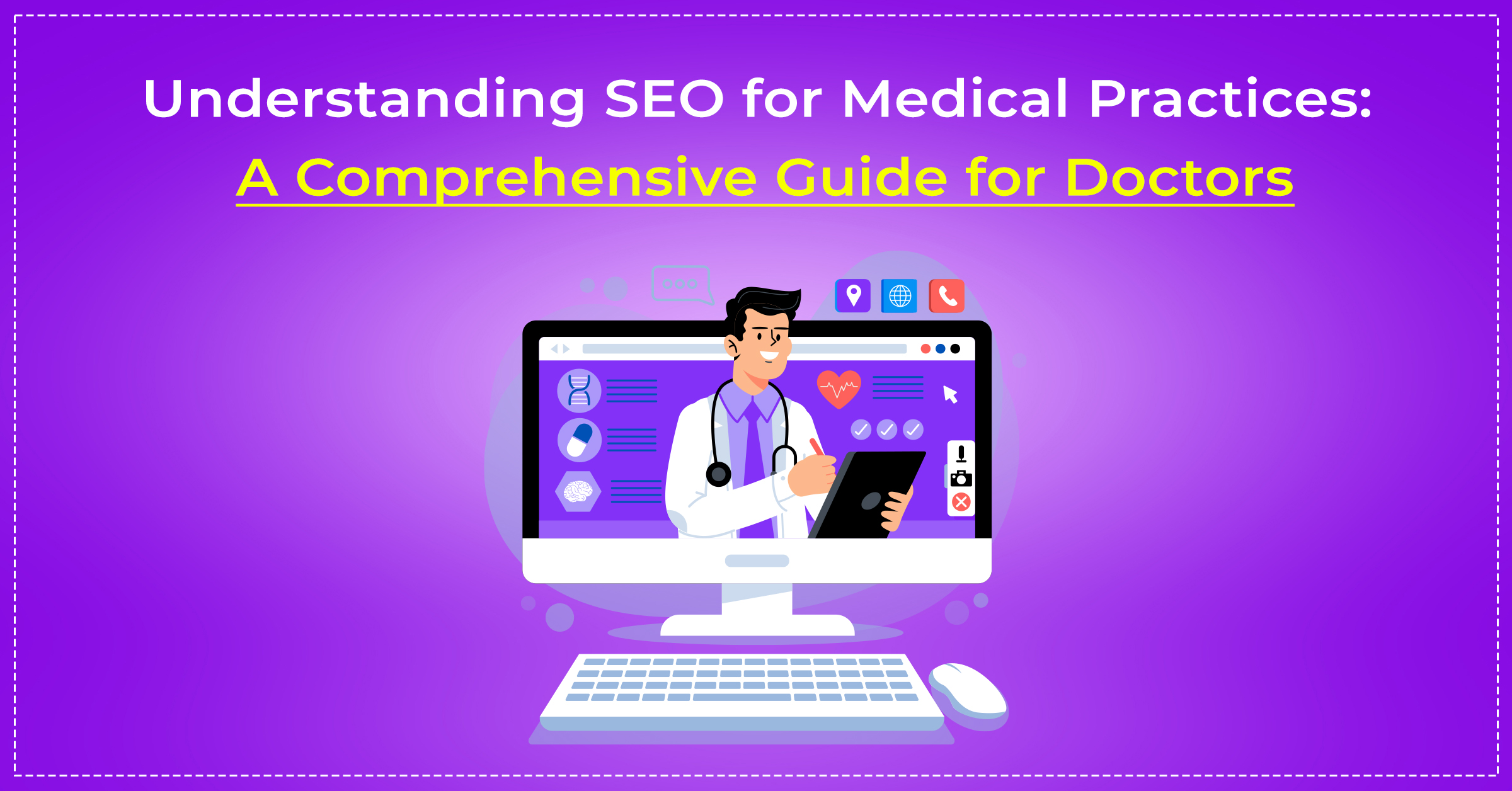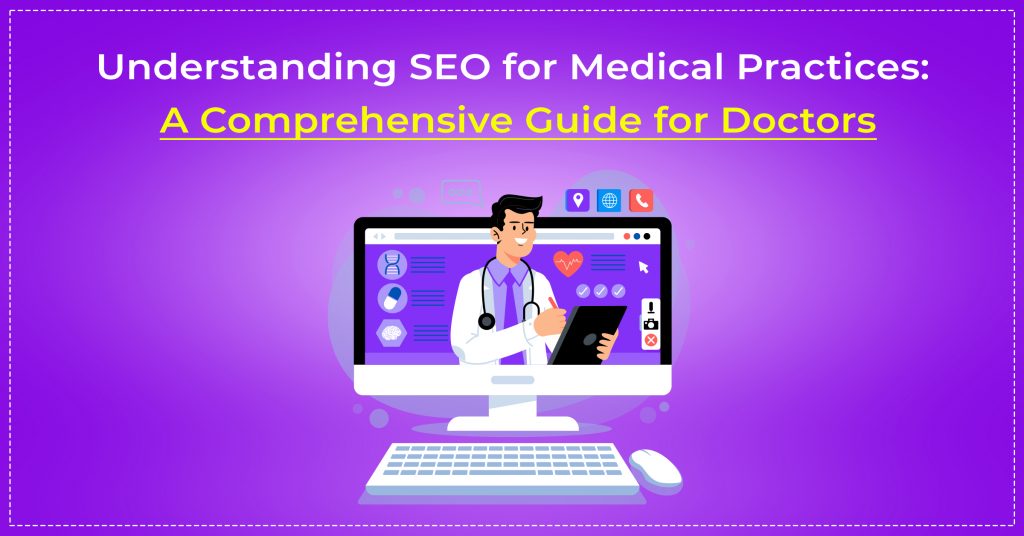Let’s explore the top 10 reasons why every business needs a website in this blog.
let’s get started.
“Just Google it” is a common phrase that we hear every time we are confused. From trivial matters to intricacies of our lives, Google listens to us patiently and gives us immediate answers; whether those answers are entirely reliable or not is a different matter. But, we all can agree that Google is our ultimate saviour in our daily lives. That’s the reason why every minute 5.9 million searches are done on Google!
Even if you’re a small-scale manufacturer or an MSME, having a full-fledged website is the key to success in this digital world.
Overview
Your potential patients are googling symptoms at 2 AM, searching for specialists during lunch breaks, and looking up “doctors near me” more than you’d think. There are around 70,000 medical-related search queries performed daily on Google alone.
Many doctors still rely on word-of-mouth referrals, but patients have changed how they seek healthcare. Patients are researching physicians online before choosing to book an appointment, reading reviews as if they were dining out, and expect to be able to find you quickly when they conduct searches. If you practice does not show up in those searches, you are missing a large portion of people who are looking for your assistance.
10 Reasons Why Businesses Need a Website
To Effectively Showcase Products and Service
Let’s assume you’re a cafe owner, you can show enticing pictures and videos of the food and beverages you serve, some special offers and discounts you give, the aesthetics of your place and so much more on your website to entice the customers and persuade them to visit.
What’s more? You can show what people have to say about your pace, any awards that you have earned, some social and environmentally friendly initiatives that you have taken like employing “local homemakers” or “eliminating plastic use”, and so much more on your website. If you’re on Zomato and Swiggy or offer home delivery services, you can mention this too on your website and turn your website into a revenue-generating source.
Thus, every business, even if you’re selling something unconventional, needs a website. You can display product demonstration videos on your product page or put up an easy-to-download usage manual to acquaint the people with what you’re selling, how to use the same and more.
Higher Visibility
A well-built and maintained website is your key to the magical world of (no, not Narnia) internet. It can increase your business’ visibility among your target audience and help you earn goodwill in your industry. Think about it, millions and billions (even more) of searches are happening every minute on Google, and by not having a website you’re missing out on so many chances to shine bright in front of your potential customers.
The best part is that even small businesses can succeed in the digital arena. As 46% of Google searches have a local intent, a blend of the right SEO and SEM techniques will allow you to entice local audiences. Taking our previous example, by using the local lingo and adapting your website for voice search, you can increase the visibility of your cafe.
Social Proof
Consumer behaviour is still affected by what others are saying about a product or a brand. That’s the reason why fidget spinners, slime, and pop became a trend and everyone started buying them. Similarly, even if you have a substantial social media presence and good reviews on Google My Business, people may still want to see your website and have a look at what you have to offer to them.
Thus, putting up your client testimonials, customer reviews, any awards that you have won, any influence with whom you collaborated, etc. on your website is a great way to encourage visitors to become paying customers.
Sell Online & Generate Revenue
It’s relatively easier to open an online store and earn revenue than to open a brick-and-mortar shop.
Think about it, for opening a physical store you would need a desirable place to rent, furniture, employees, certain equipment, etc while an online store would require hiring a web developer, discussing and designing your website, partnering with a delivery service, that’s it. What’s more cost-effective? Of course, the online store, right? Thus, there’s no doubt that an eCommerce website can help you make direct sales and earn more revenue.
For instance, if you’re a professional in making cakes, pastries, chocolates and more, and you’re just starting, instead of opening a physical shop and dying under the heap of loans, you can adopt a cloud kitchen model. All you need to start would be a safe and clean place where you can prepare the desserts for delivery and an FSSAI certification.
Your website can be the virtual store of your business. From product pages and customer reviews to on-website purchase options, it could help you generate a good profit for your business to sustain and thrive.
Improves Customer Service
Customers at times ask basic questions which can turn hectic for any business owner. Thus, having a website can help you put up a FAQ page and answer all those basic questions about your products and services in one place. Moreover, you can put up your contact details, hours of operation, business location, etc. on your website for easy reference.
Take this example, Peachybbies is a small slime business in the US. On their website, you can find a Slime Care page that answers all of the questions people have related to taking care of their slimes. It is a good way to offer satisfactory after-sales service as it shows the customers that you care about them even after they have made a purchase.
Improves Company’s Credibility
Imagine that you go to a shopping centre and find two types of pickles there. One has a company’s name, ingredients, manufacturing date, shelf life and every information a buyer would need and the other one is simply a bottle of pickle. Whom would you trust? Most likely, the branded one, right?
Now here’s one interesting fact for you; 81% of retail shoppers conduct online searches before buying anything and mobile is the most used device for these online searches.
Thus, by not having a website, you’re doing more harm than good to your business. When customers don’t see your business popping on their screen after a Google search, they are unlikely to recognise your product when they see it in a physical store, which translates to low sales. Thus, for improving a company’s credibility, it’s imperative to have a website.
Takes Your Marketing to the Next Level
If you’re already investing in social media marketing, a website can be your one-stop shop where all your leads assemble. Getting people to your website can be comparatively easier than retaining them. Thus, having a sound user interface, clear navigation, attractive layout, and clear CTA on the website can help turn those leads into paying customers. Thus, websites are a crucial element of your digital marketing efforts and must be made with care.
Strategically Tap Your Target Audience
Heard about the untold rule in marketing. You cannot sell everything to everyone. Audience targeting is made way easier with digital marketing and websites are of immense help for the same.
With proper on-page SEO efforts, you can tap into your target audience and turn them into paying customers. For instance, you can use audience-specific keywords in your blogs, product pages, home page and more to stand high in your target customer’s SERP.
Compete Globally
Social media marketing has its limitations. For instance, TikTok marketing may work in countries like the US but not in India since the app itself is banned. On the other hand, having a website can allow your business to become multinational and expand its clientele.
For instance, imagine you’re a tattoo and henna artist. Having a website would allow you to bag clients from different cities, states, and even countries thus, allowing you to compete globally.
Get Found in Search Engine Results
One obvious benefit of having a website is it allows your target audience to find you on search engines. Billions of searches are happening on Google every minute. There is tremendous business potential if you have a website as it organically gives your business high online visibility.
However, getting on the first page of a search engine is a hard nut to crack and would require an exceptional website and high-end technical, on-page SEO and off-page SEO. You can avail of our SEO services to take your online business to the next level.
That’s why investing in a web development service is essential. If you’re looking for web development or eCommerce development services, you’re in the right spot! At Eiosys, our tech-savvy team offers robust web development services. We have created an online presence for hundreds of businesses.
Read our detailed blog on things to consider while building a website to gain an understanding of web development, design, and user experience.
We at Eiosys have a team of professional and skilled web developers and designers who work tirelessly to ensure the best website for our clients and their customers. All you have to do is tell us about what you want and sit back and relax while we work to make your dream website live on the internet. Sounds interesting? Contact Us Now for Web Development or eCommerce Web Development services.
Medical SEO Strategy Comparison
| Strategy Type | What It Does | Time to See Results | Best For | Difficulty Level |
| Local SEO | Shows up in “near me” searches | 2-4 months | All medical practices | Beginner friendly |
| On-Page SEO | Optimizes individual web pages | 3-6 months | Practices with websites | Moderate |
| Off-Page SEO | Builds authority through external links | 6-12 months | Established practices | Advanced |
| Keyword Research | Targets what patients actually search | 1-3 months | Everyone starting SEO | Beginner friendly |
| Content Marketing | Educates patients, builds trust | 4-8 months | Practices wanting to educate | Moderate to Advanced |
FAQs
Healthcare SEO is about assisting patients in finding the best medical services, when the patient is actively looking for what may be relevant to them online. It is about your practice being visible when someone conducts an online search for conditions that you can treat or services that you offer, particularly in their area.
The four main pillars of SEO are technical SEO (Site speed and structure), content, on page (keywords, meta tags), and off-page building authority with backlinks and online reviews from reputable sources.
Content, Code, and Credibility. You need high-quality medical content that is useful for patients, orderly and clean coding for your website that can be read by search engines, and good credibility signals indicating to search engines that you are trustworthy through online reviews and professional citations
Technical SEO (website performance), on-page SEO (optimizing individual pages), off-page SEO (building external authority), and local SEO (appearing in location-based searches) – which is crucial for medical practices.
Most doctors see initial improvements in 3-6 months, but meaningful patient growth typically takes 6-12 months. Local SEO often works faster than general SEO since you’re competing in a smaller geographic area rather than nationally.















